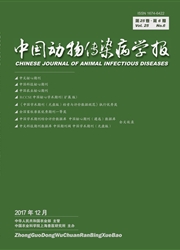

 中文摘要:
中文摘要:
通过对高致病性猪繁殖与呼吸综合征病毒(Highly Pathogenic Porcine Reproductive and Respiratory Syndrome Virtls,Hp-PRRSV)HuN4株亲本毒及其不同代次传代毒株Nsp2(Nonstnduralprotein2)蛋白氨基酸序列比较分析,发现不同代次的Nsp2蛋白存在4处氨基酸点突变,针对每个突变点分别人工合成编码短肽的核苷酸序列,经原核表达后进行Western blot分析。结果表明表达的融合蛋白F65-11(^749KGEPvsdqpak^759)能够特异性的与HuN4-F40、HuN4-F65和HuN4-F112感染猪的血清发生反应,而与HuN4 F5感染猪的阳性血清和CH-1a株阳性血清不发生反应,证实第4个氨基酸点突变(S754)处存在一个免疫优势抗原表位。将该表位肽段由N端和C端逐步缩短继续鉴定,当N端缩短到第5个氨基酸(^754SDQPAK^759)C端缩短到第3个氨基酸(^749KGEPVSDQ^757)时,表达的融合蛋白不能与PRRSV阳性血清反应,最终推测该抗原表位必需氨基酸为^753VSDQ^756。选取GenBank中提交的部分高致病性猪繁殖与呼吸综合征病毒的Nsp2氨基酸序列,对该表位氨基酸所在位置进行序列比较,分析结果显示位于Nsp2蛋白749→759位氨基酸序列高度保守,F65—11变异位点C^754→7^754为HuN4株系列传代毒株所特有。本研究结果证实抗原表位F65—11可以作为鉴别HuN4-F112弱毒疫苗所诱导产生的特异性抗体的候选抗原。
 英文摘要:
英文摘要:
The amino acid sequences of the non structural protein 2 (Nsp2) of porcine reproductive and respiratory syndrome virus(PRRSV)HuN4 strain at different passages were analyzed and 4 mutations were identified. A series of peptides were designed and expressed in prokaryotic system to characterize a specific epitope that differentiates attenuated viruses from the parent strain. Western blot analysis revealed that the fusion protein F65-11 (^749~ KGEPVSDQPAK^759) could specifically react with PRRSV passages HuN4-F40, HuN4-F65 and HuN4 F120 positive serum but not with low passage HuN4 F5 and Ch-1a positive serum, suggesting an epitope exists in this peptide. When the fusion protein F65-11 was shortened to the 5th amino acid (^754 SDQPAK^759 ) at the N terminal or to the 3rd anlino acid (^749KGEPVSDQ^757) at the C terminal, it could not react with any of PRRSV positive sera tested. Thus, the core amino acid sequence was identified as ^753VSD^756. In the parent HP- PRRSV sequence, the amino acids at 749 to 759 of Nsp2 region were conserve& The amino acid mutation C^754→S^754 was found only in high passages of PRRSV HuN4 strain. Result have demonstrated that the fusion protein F65-11 contains an epitope that exists in high passages of PRRSV HuN4 strain and therefore it can be used in the differentiation of protective immune response induced by attenuated vaccine strain HuN4-F1l2.
 同期刊论文项目
同期刊论文项目
 同项目期刊论文
同项目期刊论文
 期刊信息
期刊信息
